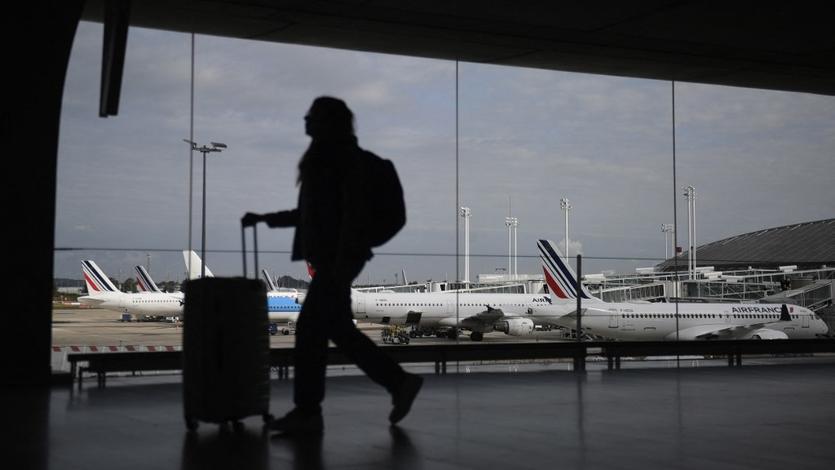 A traveller walks in the Terminal 2 corridors of the Roissy-Charles de Gaulle airport with Air France airplanes in the background, in the northeastern outskirts of Paris, on Sept 16, 2022, amid a strike of air traffic controllers.
JULIEN DE ROSA / AFP
A traveller walks in the Terminal 2 corridors of the Roissy-Charles de Gaulle airport with Air France airplanes in the background, in the northeastern outskirts of Paris, on Sept 16, 2022, amid a strike of air traffic controllers.
JULIEN DE ROSA / AFP
GENEVA - Global airlines are predicting their first industry-wide profit since 2019 next year while warning that passengers face higher ticket prices as the industry moves towards its target of reducing emissions to net zero by 2050.
Airlines lost tens of billions of dollars in 2020 and 2021 due to the pandemic, but air travel has partially recovered and some airports have struggled to cope.
The International Air Transport Association (IATA) now expects a net profit of $4.7 billion for the industry next year, with more than 4 billion passengers set to fly. It had previously said only that profits were "within reach" in 2023
The International Air Transport Association (IATA) now expects a net profit of $4.7 billion for the industry next year, with more than 4 billion passengers set to fly. It had previously said only that profits were "within reach" in 2023.
For 2022, IATA narrowed its forecast for industry-wide losses to $6.9 billion from $9.7 billion.
"That is a great achievement considering the scale of the financial and economic damage caused by government-imposed pandemic restrictions," IATA Director General Willie Walsh said on Tuesday, referring to the projected 2023 return to profit.
But the former British Airways and IAG boss warned that many airlines will continue to struggle next year, citing regulations, high costs and inconsistent government policies - and reopening a long-running dispute with airports.
"It's very important that everybody understands just how fragile the recovery is. Yes we are recovering; yes the momentum is improving; yes, we expect it to continue to improve in 2023," Walsh told an annual media briefing.
ALSO READ: IATA: Asia-Pacific airline traffic recovery to speed up as rules ease
"But the margins we are operating with are very small and we cannot tolerate a situation where airports in particular attempt to gouge airlines and their passengers by significant increase in airport charges. Every single cent matters."
 This photograph taken on Sept 16, 2022, shows travellers looking at the departure information panel of the Terminal 2 of the Roissy-Charles de Gaulle airport, in the northeastern outskirts of Paris, as it announces multiple cancelled flights amid a strike of air traffic controllers.
(JULIEN DE ROSA / AFP)
This photograph taken on Sept 16, 2022, shows travellers looking at the departure information panel of the Terminal 2 of the Roissy-Charles de Gaulle airport, in the northeastern outskirts of Paris, as it announces multiple cancelled flights amid a strike of air traffic controllers.
(JULIEN DE ROSA / AFP)
Airports immediately pointed the finger back at airlines. Tensions have been high since Europe's summer travel chaos.
"Consumers are tolerating massive increases in air fares by airlines, which reflects both inflationary pressures and the fact that they tightly control the capacity they put in the market," Olivier Jankovec, director general of airport industry association ACI Europe, told Reuters.
Airport fees reflect the same inflationary pressures, he said, adding: "So I ask you, who is really gouging who here?"
Higher fares from green transition
Walsh earlier defended oil-driven fare increases and warned the shift to green fuels could force prices up further. Air fares have already jumped this year as a result of higher prices for conventional fossil-based jet fuel.
"You cannot expect an industry making on average $1 profit per customer to absorb the increases we’ve seen," Walsh said.
"Going forward as we see increases in carbon costs...there has to be an impact on ticket prices as the industry transitions to net zero. The airlines cannot absorb increased costs."
ALSO READ: Global airlines to narrow losses in 2022 as outlook improves
Environmental groups argue that air higher travel costs will help to rein in emissions by curbing growth in traffic.
Walsh praised efforts by the United States to lift output of clean fuels, in apparent contrast with European objections that new US incentives could create an uneven playing field.
Downside risk
IATA believes global air traffic levels will return to pre-COVID or 2019 levels by 2024, led by the United States, and with Asia-Pacific "notably lagging."
IATA Chief Economist Marie Owens Thomsen warned that the risk to the latest forecasts on the sector remained "skewed to the downside". Airline traffic is closely tied to consumer and business confidence.
Walsh also hit out at jet manufacturers who were struggling to deliver aircraft and blaming their supply chains.
"It is causing a lot of frustration. It is adding to the cost base. When I speak privately to CEOs it's creating a lot of anger,” he said.
READ MORE: How COVID-19 ripped apart global airlines' business
Delays have left Airbus a near-record challenge in December and its end-year delivery target could be trimmed as early as this week, Reuters reported on Friday.
On consolidation, Walsh said airlines had survived the worst of the downturn, but Europe remained an area to watch.
"I think the challenge for some airlines still exists, because as we've seen, the industry is still only marginally profitable. In fact, in Europe we can say we are breakeven," Walsh said.
"So there's clearly still financial pressure. The difference is airlines are generating cash now. Liquidity was the critical issue."


